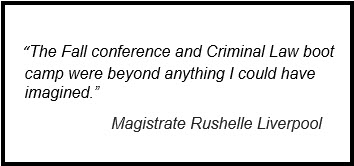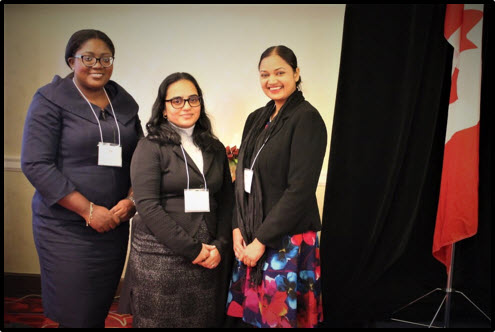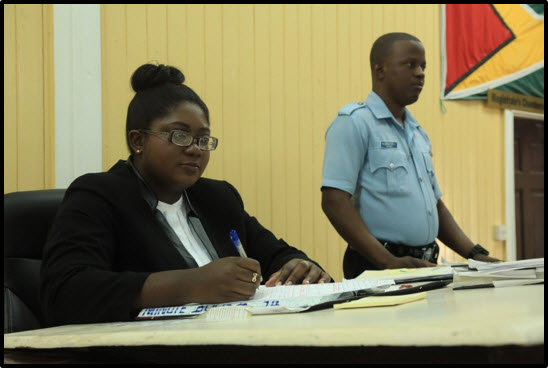Periodically the BC Provincial Court’s Criminal Law Committee offers a three day Criminal Law Boot Camp – an intense, interactive judicial education program designed for new judges whose work as lawyers involved other areas of law. Last month the judges attending the boot camp included some guests – three members of the Guyanese judiciary.
The Guyanese magistrates’ primary goal wasn’t to learn about Canadian law, but to see first-hand how our court plans and presents judicial education. Their study tour was arranged by the BC Justice Education Society (JES) as part of its “Strengthening the Criminal Justice System in Guyana” project. Funded by the US Department of State / Bureau of International Narcotics and Law Enforcement Affairs, the project aims to strengthen the integrity and responsiveness of Guyana’s justice system and includes training for police, prosecutors and judges.

During their trip to Vancouver Principal Magistrate Judy Latchman, Senior Magistrate Zamilla Ally-Seepaul and Magistrate Rushelle Liverpool also attended one of the Court’s two annual education conferences – this one focussed on “Indigenous Peoples and the Law”. In addition they observed a bail hearing, met with the Chief Judge, the Chair of the Court’s Judicial Education Committee, and the Director of Integrated Programs at the Downtown Community Court/Drug Treatment Court of Vancouver, and learned about the JES’ education programs for students and the public.

Left to right - Magistrate Liverpool, Senior Magistrate Ally-Seepaul and
Principal Magistrate Latchman
The BC Provincial Court has been involved in the project since 2015, with contributions by former Chief Judge Thomas Crabtree, Chief Judge Gillespie and Judge Michael Hicks including:
• participation in magistrates’ seminars
• the Court hosting representatives of Guyana’s justice system on a 2016 study tour focussed on court administration and specialized treatment courts. (See Why did Guyanese judges visit BC Provincial Court?)
Following the 2016 study tour, the Magistrates Court in Georgetown set up bail/first appearance courts to streamline case management. Principal Magistrate Latchman has presided in one of these pilot courtrooms since February 2017.
To ensure training results are sustainable, the JES project is working with the judiciary to create a judicial education strategy, with an emphasis on the Magistrates Court. The magistrates who visited Vancouver will be actively involved in setting up educational programs for their colleagues.
The magistrates plan to use their experience here when drafting a proposal to improve the delivery of judicial education in Guyana, and to share with their colleagues resources they collected concerning bail, sentencing, trial management, and indigenous law.
It’s clear from their comments that their visit was worthwhile. Magistrate Liverpool said:
Principal Magistrate Latchman added:
And Senior Magistrate Ally-Seepaul was impressed by the range of non-custodial sentencing options available to Canadian judges:

Magistrate Liverpool on the bench in Guyana
Photo credit: Stephen Herman
For more on JES’ international programs see JES International.

